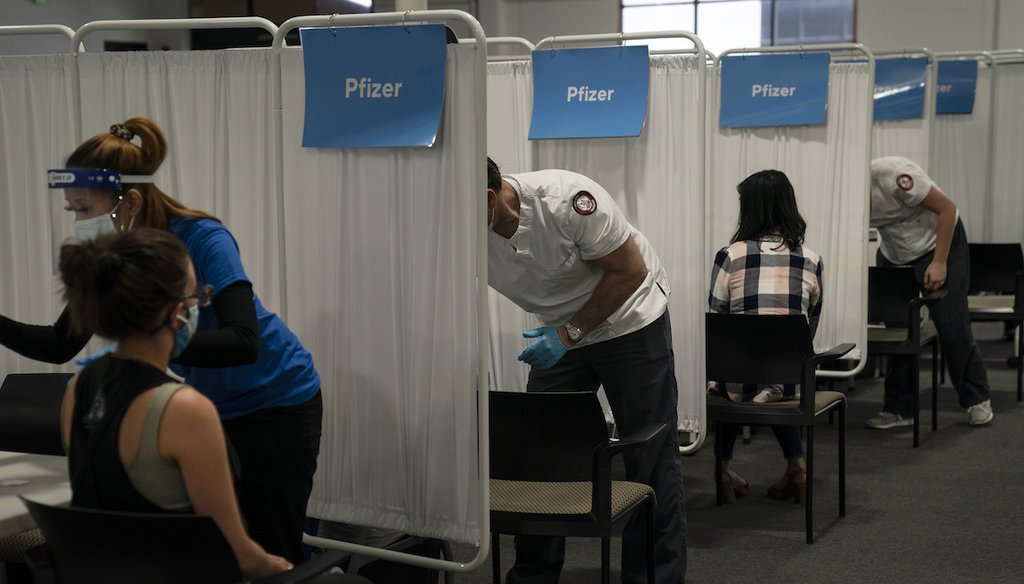

Our only agenda is to publish the truth so you can be an informed participant in democracy.
We need your help.


Pfizer COVID-19 vaccines are administered at Providence Edwards Lifesciences vaccination site in Santa Ana, Calif., on May 21, 2021. (AP/Hong)
The chances of contracting COVID-19 and dying from it are much greater for unvaccinated people.
There is no evidence that the COVID-19 vaccines have caused deaths.
A viral image shared on Facebook suggests that, when it comes to COVID-19, it’s safer to be unvaccinated than vaccinated.
The image makes its claim using a grid with checkmarks. It says that both the unvaccinated and the vaccinated can get, spread and die from COVID-19, but that only the vaccinated can die from the vaccine.
The post was flagged as part of Facebook’s efforts to combat false news and misinformation on its News Feed. (Read more about our partnership with Facebook.)
Sure, people who are vaccinated can get the virus, spread it and, in exceedingly rare cases, die from it. No vaccine is 100% effective. But getting vaccinated dramatically reduces the likelihood of a COVID-19 infection. And for those who do get COVID-19, being vaccinated makes it less likely that you’ll get seriously ill.
No proof has been established that any of the COVID-19 vaccines authorized in the U.S. have caused deaths.
Common side effects of the vaccination include temporary pain at the injection site, fatigue and fever. As for more serious potential side effects, the Centers for Disease Control has been monitoring reports of adverse events following vaccination, including allergic reactions, blood clots, heart inflammation and a nerve condition called Guillain-Barré Syndrome, and has found them to be rare or temporary and treatable. The CDC maintains that the benefits of the vaccine outweigh the risks.
Here’s a look at some numbers to understand how the risks of being vaccinated compare with the risk of not being vaccinated.
Vaccine effectiveness: Studies of the general adult population in the United States show that the Moderna and Pfizer-BioNTech vaccines have an 86% to 89% effectiveness rate against infection, and a 96% effectiveness rate against hospitalization, according to the CDC. Early evidence for the Johnson & Johnson/Janssen vaccine also demonstrates effectiveness against COVID-19, but more studies are underway, CDC said.
Vaccine safety: More than 342 million doses of COVID-19 vaccines were administered in the United States from Dec. 14, 2020, through July 26, 2021, according to the CDC. During that period, the Vaccine Adverse Events Reporting System run by the CDC and the U.S. Food and Drug Administration — which receives unverified reports of potential vaccine side effects — received 6,340 reports of death (0.0019%) among people who received a COVID-19 vaccine. But VAERS reports alone do not indicate whether a vaccine causes a particular adverse effect. "A review of available clinical information, including death certificates, autopsy and medical records, has not established a causal link to COVID-19 vaccines," the CDC said.
Deaths among unvaccinated people: On July 16, even as the delta variant of the virus began spreading, CDC Director Rochelle Walensky said that over 97% of new hospitalizations were in patients who are unvaccinated.
Breakthrough cases: The CDC’s latest data on breakthrough cases — people who become infected with COVID-19 after being vaccinated — says that as of July 26, of the more than 163 million people who had been fully vaccinated, 6,587 were hospitalized or died in the 49 states and territories that report their data to the CDC. Of the 1,263 deaths, 309 were reported as asymptomatic or not related to COVID-19.
The nonprofit Kaiser Family Foundation drilled down to infection rates, finding that among 25 states that report breakthrough cases publicly, the infection rate is well below 1%, ranging from 0.01% in Connecticut to 0.29% in Alaska. The CDC has found evidence suggesting that, although it’s rare for vaccinated people to become infected, those who do can spread the virus as readily as unvaccinated people who get infected.
We rate the claim that it’s safer to be unvaccinated than vaccinated against COVID-19 as False.
Facebook post, Aug. 2, 2021
PolitiFact, "Fact-checking Tomi Lahren on vaccines and COVID-19 survival chances," July 21, 2021
Johns Hopkins University, "Delta Variant: New Data on COVID-19 Transmission by Vaccinated Individuals," Aug. 2, 2021
PolitiFact, "No, it’s not safer to skip the COVID-19 vaccine to avoid permanent side effects," March 31, 2021
New York Times, "Vaccinated People May Spread the Virus, Though Rarely, C.D.C. Reports," July 30, 2021
U.S. Centers for Disease Control and Prevention, "COVID-19 Vaccine Breakthrough Case Investigation and Reporting," July 29, 2021
U.S. Centers for Disease Control and Prevention, "Science Brief: COVID-19 Vaccines and Vaccination," July 27, 2021
U.S. Centers for Disease Control and Prevention, "Selected Adverse Events Reported after COVID-19 Vaccination," July 26, 2021
The White House, "Press Briefing by White House COVID-19 Response Team and Public Health Officials," July 1, 2021
The White House, "Press Briefing by White House COVID-19 Response Team and Public Health Officials," July 16, 2021
Kaiser Family Foundation, "COVID-19 Vaccine Breakthrough Cases: Data from the States," July 30, 2021
Associated Press, "Nearly all COVID deaths in US are now among unvaccinated," June 29, 2021
CNN, "About 99.999% of fully vaccinated Americans have not had a deadly Covid-19 breakthrough case, CDC data shows," Aug. 2, 2021
In a world of wild talk and fake news, help us stand up for the facts.
